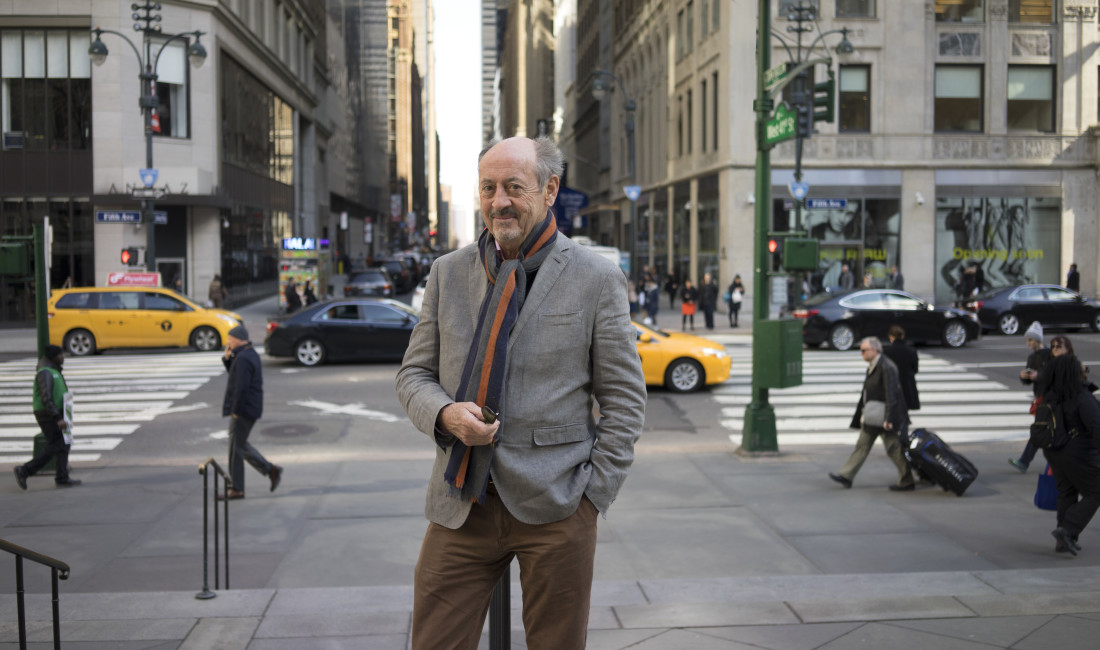Don’t compare Billy Collins‘ poetry to sketch comedy. He won’t like that one bit.
Sure, some of his work is funny. Many of the 20 lines of “Bachelorette Party” are about the word “bachelorette,” and how it could just as easily mean “tiny bachelor.” “Cosmology” presents an alternate universe in which the entire planet rests on Keith Richards’ head, and “as long as Keith keeps talking about / the influence of the blues on the Rolling Stones / the earth will continue to spin merrily.” Elsewhere in his new collection, The Rain in Portugal, the poet places William Shakespeare on a modern airliner (sharing a set of earbuds with Collins) or follows his own thoughts to absurdist extremes.
Just don’t get too stuck on his punchlines — or worse, think they are the point of his verse.
“The making of a poem is different from anything,” says Collins, who will give a reading and book signing at Christ School in Arden (the alma mater of yet another U.S. poet laureate, Charles Wright) on Wednesday, Nov. 9. “Poetry, if you think about its lineage and its history, is unflattered by comparisons to comedy sketches.” Compare his poetry to this lesser form of entertainment, as he puts it, and you denigrate it.
If Collins is confident, he’s also been wildly successful. From 2001-03, he was poet laureate of the United States. The 9/11 terrorist attacks occurred during his term, presenting him with the daunting prospect of writing a poem to commemorate the first anniversary of that event; he rose to the occasion with “The Names.”
The Rain in Portugal is a New York Times best-seller, and Collins has seen six-figure book deals — both rarities in the world of verse. This year, he was inducted into the American Academy of Arts and Letters.
He’s received criticism for being too playful and for not burdening his poetry with personal misery. “I don’t start out to amuse, I don’t start out to be funny,” Collins says. “I don’t start out to do anything except for to make a good poem and, in the process, to entertain myself.” He isn’t compelled to write “I had an experience walking in an orchard once, and I saw the full moon, and I’m going to tell you about it” poetry, he says, lambasting that approach. It’s claustrophobic, he explains, with that kind of verse stuck in the past of the speaker.
Rather, Collins writes from a persona that is not interested in personal experience unless it’s imaginative or cerebral. Accordingly, many poems — “The Bard in Flight” or “Poem to the First Generation of People to Exist After the Death of the English Language” — were born of thought experiments. The speaker in the latter work is a pissed off, crotchety imaginary poet lamenting the loss of his parlance.
“It’s fun to get down on your hands and knees and play with the language and find yourself in the interior of something that is being made, and not knowing what it is going to look like in the end,” Collins says. When he conducts poetry workshops, he tells attendees they aren’t there to express themselves, but to build something. Think of it as a cabinet or a birdhouse, he says. Think of your poem as something you’re constructing to delight a reader.
Humor can be a part of that. Collins treats it as a strategy rather than a means in itself: A serious poem can turn funny, or an initially funny poem can end up tragic. He requires a poem to proceed from one place to another, anyway, so it’s not going to come out like sketch comedy or a sitcom like “Seinfeld,” he explains, where there has to be a laugh every dozen seconds. “And yet those programs pretend to handle real life, romance, divorce, getting in trouble with the law, all sorts of things,” he says.
Collins has also been criticized for is his success. “I sell a lot of books. Frankly, if I were not Billy Collins and I were a poet. I wouldn’t like me very much either,” he admits. “I don’t think I would go as far as to get a gun and shoot my books, but I would harbor some simmering resentment.”
Last spring, the owners of The Captain’s Bookshelf did discover a copy of Collins’ Nine Horses that had been blasted with a shotgun. It was disturbing news, Collins says, but it wasn’t hard to interpret — this was the work of a person who seriously doesn’t care for his work. Maybe they thought it was too light or maybe they were jealous of Collins’ popularity.
“Here’s a paradox,” the poet says. “It seems to me that the people who wring their hands over the lack of a popular mass audience for poetry are the same ones who are quick to attack anyone who breaks out of the pack and manages to secure a wider audience.”
WHO: Billy Collins reading and book signing
WHERE: Pingree Auditorium at Christ School, 500 Christ School Road, Arden
WHEN: Wednesday, Nov. 9, 6 p.m. Free, but ticketed. The event is at capacity at press time; join the wait list at avl.mx/33n




Before you comment
The comments section is here to provide a platform for civil dialogue on the issues we face together as a local community. Xpress is committed to offering this platform for all voices, but when the tone of the discussion gets nasty or strays off topic, we believe many people choose not to participate. Xpress editors are determined to moderate comments to ensure a constructive interchange is maintained. All comments judged not to be in keeping with the spirit of civil discourse will be removed and repeat violators will be banned. See here for our terms of service. Thank you for being part of this effort to promote respectful discussion.